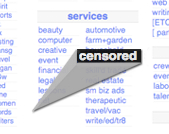Craigslist and the Law of Unintended Consequences
 Craigslist has recently been under attack by a number of state Attorneys General over the "adult services" ads that certainly include some ads for illegal prostitution. Although Craigslist has no legal responsibility to monitor or remove such advertisements, the AGs were calling on the site to take down the category. Over the weekend, in the United States at least, Craigslist replaced the category with the label "CENSORED." The AGs are now crowing over this change, asserting that it somehow helps in the fight against prostitution.
Craigslist has recently been under attack by a number of state Attorneys General over the "adult services" ads that certainly include some ads for illegal prostitution. Although Craigslist has no legal responsibility to monitor or remove such advertisements, the AGs were calling on the site to take down the category. Over the weekend, in the United States at least, Craigslist replaced the category with the label "CENSORED." The AGs are now crowing over this change, asserting that it somehow helps in the fight against prostitution.
But recall that Craigslist created the "adult services" category in the first place because without the category, adult ads showed up in a broad range of non-adult categories. Craigslist hosts 50 million new ads every month, and there is no way that it can monitor and remove adult ads that show up in thousands of categories across the site (and under U.S. law, the site plainly has no obligation to do so). So to somewhat clean up the site, Craigslist decided to push all such ads into one category, thereby keeping them out of the non-adult categories.
Now that they have disabled the adult services category at the behest of the AGs, it seems like a 100% certainty that adult ads will now go back to the non-adult categories. And Craigslist will be unable to stop them.
This reminds me of the unintended consequences that flowed from Congressional agitation during the 1990s over dial-a-porn, services that allow one to call a phone number and hear someone else talk dirty. Congress had sought to regulate such calls, but ran squarely into the First Amendment, which protects adult content from overbroad regulation. After some back and forth, and action by the FCC, dial-a-porn was forced into one of two telephone exchanges — "900" numbers, or "976" numbers.
This development proved to be beneficial for parents concerned about dial-a-porn, because they could very easily contact their phone companies and instruct the service provider to block all 900 and 976 numbers from their phone. This allowed parents to completely protect their kids, while not infringing on the right of households without kids to use the adult services.
But this was not good enough for Congress, which imposed even stricter regulation on dial-a-porn. In reaction, the dial-a-porn industry did two things: they largely stopped using 900 and 976 numbers, and they moved to the Caribbean, where they set up shop on phone numbers that look like normal U.S. numbers, but in fact are overseas long distance numbers (and they cooperated with the Caribbean phone companies to get a cut of the long distance revenue). The end result was that dial-a-porn continued, but it now was virtually impossible for parents to block such services from their home. When dial-a-porn was clustered into 900 and 976 numbers, they were easy to block, but after Congress acted, they became much harder to block. What had been an easy-to-solve problem now was not so easy.
This seems to be exactly what the AG's have done in this Craigslist situation, taking an easy-to-monitor and block problem and made it much, much harder for law enforcement to keep track of, or for parents to block. It was very easy for filtering software companies to block all of Craigslist adult services categories, but now it is impossible for those companies to do anything to block adult ads (other than blocking all of Craigslist entirely). And now, users of Craigslist ads will encounter adult ads in lots of non-adult categories.
To recap, it seems that the AGs have (a) made it harder for law enforcement to police the adult ads, (b) made it harder for filtering companies to block the adult ads, and (c) made it much more likely that innocent Craigslist users, including kids, will encounter unwanted adult ads. So, why exactly is this a good development?


